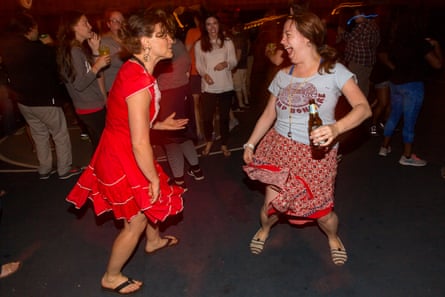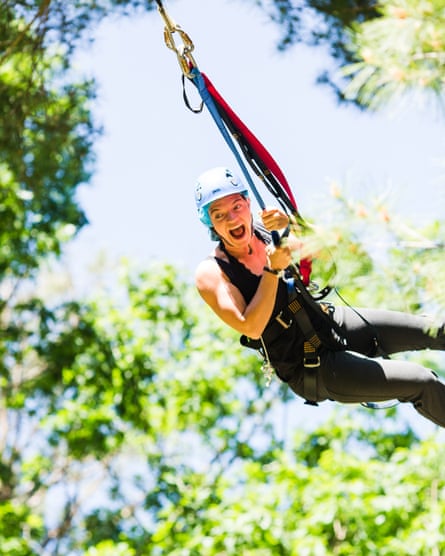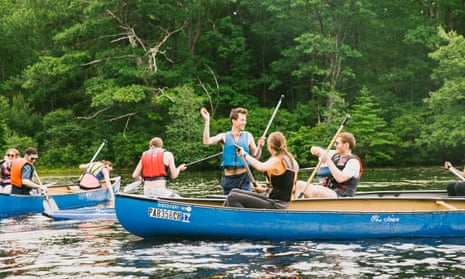Marshmallows toasting on an open fire beneath a star-filled sky, kayaks, hammocks, mosquito bites, first kisses. Who doesn’t love camp? Nostalgic adults can now rejoice: it’s not just for kids anymore.
Adult camps are a booming business in the US as stressed adults head for the hills to unleash their inner child. On a hot but breezy Friday morning in June, it was easy to recognize fellow campers in midtown Manhattan. As most New Yorkers hurried to work, campers – clutching their pillows and sleeping bags – sported a sheepish smile. “Are you going to camp?” said one as we looked for the bus that would take us to Camp Bonfire in Pennsylvania.
Camp Bonfire was started by Jacob Winterstein and Ben Camp last year and is held at Lake Owego camp for boys, where the two met as children. This year, about 170 people attended the camp’s second sold-out session, paying between $449 and $499 each.
With adults searching for new ways to achieve work-life balance and make friends, adult camps have become a million-dollar industry. This year, weeks before kids across the nation finished off the school year, adults got first dibs on cabins and campgrounds in the hopes of reliving some of their happy childhood memories.

While there are many activities such as card-printing, jewelry-making, canoeing, archery, rock climbing, kickball and so on, the campers are allowed to do whatever they like. The camp’s slogan, reiterated over and over during the weekend, is: “You’re a grown-ass adult. Do what you like.”
“You want to lay in a hammock and read a book for six hours? OK, but other people might glare at you,” said Winterstein, to laughter from the campers.
The only thing you cannot do at Camp Bonfire is be on your phone. That is, unless you are in the designated technology area, which is located in a far corner of the campground in a space used for most of the year as the shooting range. Surprisingly few people took advantage of the tech zone, perhaps because we were encouraged to shame anyone using their phone outside the area by trilling our best phone-ringing impression.

Camp Bonfire started as a place to go with friends and friends of friends, but word has quickly spread beyond Philadelphia, where both Winterstein and Camp live. This year, campers came from as far as Houston, Nashville and Cleveland.
“We are trying to figure out if it’s a fad or if it’s something that will be around for a while, where people could come to for the next 30 years,” said Camp, noting that they are hoping to expand Camp Bonfire along the eastern seaboard.
“We want this to be a place that’s welcoming to people of all ages,” added Winterstein, pointing out that campers range in age from early 20s to mid-70s. “We want this to be a camp that we can grow old into.”

Adam Tishauer, founder and head camper of Camp No Counselors, appeared on Shark Tank, the US version of Dragons’ Den, in May in the hopes of raising funds to expand his camp. Serving the “sharks” with s’mores – a typical camp snack – Tishauer stood before them and asked for $300,000 investment in exchange for 7.5% of his business.
At this camp, mornings start with bloody marys and mimosas. “Play like a kid. Party like a grown up. All the camp classics but with a twist ... an open bar,” according to Instagram and Facebook ads for the camp.
Charging $478 per person, four camps grossed $160,000 last year. This year, Camp No Counselors expanded to organize weekends in Boston, Austin, Chicago, Los Angeles, Nashville, New York, San Francisco, Miami and more. At the time of Tishauer’s pitch, the camp planned 11 weekend camps with 1,800 people, whose average age was 30. It had grossed $730,000 so far and was expected to reach $800,000, with $165,000 in profit.
Tishauer wants to do 30 camps next year and projects profits will reach $800,000. His valuation of his adult camp business is $4m. Despite noting that Camp No Counselors is a “brilliant idea” and self-sustaining business, no sharks bit.
“It sucks. There’s a lot of insects. You get eaten alive,” said Kevin O’Leary, one of the sharks who used to be a camp counselor and described himself as “masterful canoeist”.

“Today, I like a mint on my pillow when I go to bed. I don’t want to be anywhere near a camp. I don’t know why these people would do this,” he said.
Another shark, Daymond John, pointed out that overnight activities with alcohol can be a liability.
A New York Observer reporter who attended a weekend at Camp No Counselors this year reported on an impromptu 60-person drinking game involving flipping cups. At Camp Throwback, another adult camp near Dayton, Ohio, or at Camp Bonfire, campers are more likely to break into song than start a drinking-game tournament.
While there is no day-long open bar at Camp Bonfire, some cocktails and beers were available both evenings courtesy of Brooklyn Brewery. As anyone who has ever watched a movie about camp will know, there are often rivalries between camps.

“They are doing their thing,” Camp said when asked about Camp No Counselors business model. “I wouldn’t want to go to that camp. I want to go to this camp.”
That seems to be the consensus among other campers as well. “Who wants to have a weekend free of drunk assholes?” Winterstein and Camp asked on Friday. All hands went up.
It’s nice to be doing something that is “not centered around alcohol”, said Karine Semple, 29, who pointed out that many weekend activities like going out and brunch include drinks. “We live for the weekend. I love being outside with other people.”
Semple, who works as a senior health analytics consultant, flew in all the way from Houston to attend the camp. Earlier this year, she made a list of things to do by herself before turning 30: go on a yoga retreat, travel to Europe, spend the weekend at an adult camp. Semple did not really “do” camps as a child. She lived in Scotland until she was 10, at which point her family moved to Texas.
“It’s truly a camp experience in every way,” she said, noting that she had “not been surrounded by such a diverse group of people in a long time”.
Leora, 41, skipped her college reunion to attend Camp Bonfire for a second time this year.
“It’s nice to come back. You don’t get nervous when you don’t know anyone,” she said. This year, her many activities included freestyle rap session with Winterstein and archery. “I tried to do different things this year. I tried to push myself. I felt more empowered this time around.”

While not as brave as she was when she was younger, Hattie Johnson, 25, tried out the high ropes – where other campers pull you up in the air and then let you swing over the trees.
“I went to camp as a kid and it was one of the best parts of my childhood and I wanted to experience that again,” said Johnson, who flew in from Nashville, where she works as a logistics analyst.
Another challenge she faced that weekend? Surviving without her phone.
“Telling time gets tricky,” she says laughing, pointing at her bare wrist. “At the same time, it was nice to be disconnected and not worry about work.”
One camper admitted to checking her phone late at night inside her cabin. Afraid that the glow of her phone would give her away despite the low brightness setting, she zipped herself completely inside her sleeping bag.
At Camp Throwback, phones are allowed and according to Brittany Gibbons, camp’s founder, most people use them in “really light social settings”.
“They are Instagramming pictures of where they are going or taking videos. It’s great advertisement on our end but its also lasting memories for them,” she said. “I haven’t caught anybody working.”
But Camp Bonfire wants to keep it old-school and its campers seem happy. Being without a phone “was amazing”, says Semple, on the bus back to New York as the weekend came to an end.
“I have a few messages but none of them were urgent. It’s a good reminder that there are more instances when I do not need my phone,” she explained, noting that phones are often used as a crutch in social situations. “If everyone around you is on the phone, you want to be on the phone, too.”

Comments (…)
Sign in or create your Guardian account to join the discussion